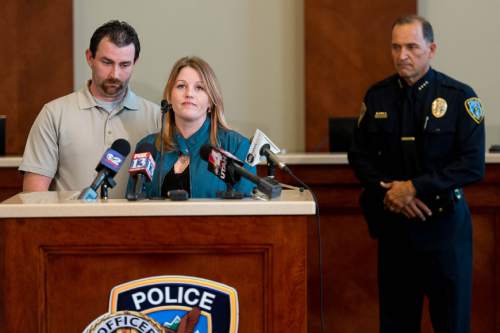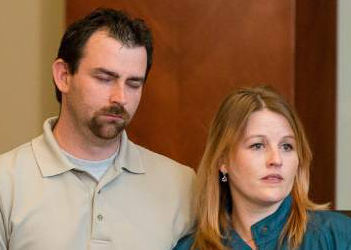This is an archived article that was published on sltrib.com in 2015, and information in the article may be outdated. It is provided only for personal research purposes and may not be reprinted.
A juvenile court judge continued to hear evidence Thursday as he weighed whether a now-17-year-old boy should go to trial in juvenile or adult court for the 2012 beating death of 15-year-old Anne Kasprzak.
Much of Thursday's testimony was closed to the public and media as psychologists testified about the teen defendant's mental health and other private information.
The teen, who was 14 when Kasprzak died, is charged in 3rd District Juvenile Court with first-degree felony murder and second-degree felony obstruction of justice.
The Salt Lake Tribune generally does not identify juvenile defendants unless they have been certified to stand trial as an adult.
The juvenile's father testified on Thursday afternoon, saying his son was a "typical 14-year-old boy" in 2012.
He was outgoing, the father said, and was never cruel to animals or bullied his peers.
The son's favorite pastime was playing video games, the father said, adding: "I don't know of any teenage kid that doesn't."
After three days of preliminary hearing testimony, Judge Dane Nolan bound the case over for trial on Wednesday. It is now in the certification phase, where Nolan will hear evidence and then decide whether the teen's case should stay in juvenile court or be moved to the adult court system.
Prosecutors have asked that the teen be tried as an adult because of the nature of the crime.
The victim's mother, Veronica Kasprzak-Bratcher, said Wednesday outside of court that their family hopes he stands trial in adult court.
"He made a pretty adult decision," she said. "This wasn't a one-time, accidental 'I lost my temper.' This was brutal. And that's a pretty adult decision to make."
Kasprzak-Bratcher said she's concerned that if the case stays in juvenile court, the accused teen will be released from custody when he turns 21 — in just over three years.
"He'll be 18 in three months," she said. "In three years, he'll be able to walk away. Annie didn't get to walk away."
On Thursday, representatives of both the Utah State Prison and Juvenile Justice Services testified about the services offered to inmates.
Dorie Farah, who works with JJS, told the judge that they lose jurisdiction over a juvenile offender when the child turns 21 and is automatically released from their care.
Defense attorney Bill Russell pointed out during the testimony of Robert Powell, a deputy warden at the state prison, that the teen defendant would face a much heftier sentence in the adult system: While there is a possibility of parole, Powell said he could only recall one convicted killer who was ever released from the prison.
Both Powell and Farah were questioned about treatment options at the juvenile versus adult facilities, as well as the opportunity for education. Powell said a juvenile offender committed to prison is segregated from the adult inmates until he or she is 18 years old. But Russell pointed out that the teens are held in the Uinta 1 unit — the same unit that gang members, death row inmates and other high profile offenders are housed.
Deputy Salt Lake County Attorney Peter Leavitt said Wednesday the evidence surrounding Kasprzak's slaying "clearly points in one direction" — her boyfriend — and that "if ever there was an adult crime committed, this is it."
Lavitt called the murder a "very sophisticated and complex crime" and argued that the defendant used the girl's assertions that the boy had gotten her pregnant as a motive for the homicide.
"He took that motive and created a plan to murder," Leavitt said.
He also pointed out that the defendant and the victim had called each other 10 times March 10, 2012, the night Kasprzak went missing, and that investigators later found the victim's blood on the defendant's shoes.
But defense attorney Christopher Bown responded, "At the end of the day, you have innuendo and false statements by a lot of people."
"There is nothing definitive that [the defendant] did this," Bown said. "They try to make him out to be a master murderer who didn't even have the common sense to get rid of the shoes."
A cellphone expert testified Wednesday that they were able to pinpoint where the defendant was when Kasprzak's mother called him at 9:01 that night.
He was near a pedestrian bridge west of 12600 South along the Jordan River Parkway in Draper, testified Sy Ray, who is the president of a company that specializes in police cellphone investigations.
That's the same bridge — upstream from where the girl's beaten body was later pulled from the river — where drops of Kasprzak's blood were found the next day.
Kasprzak had been telling friends and family she was pregnant with the boy's baby, but her stepfather testified Monday that she wasn't pregnant.
The defendant was arrested and charged in October 2014, at which time he was living in Colorado.





